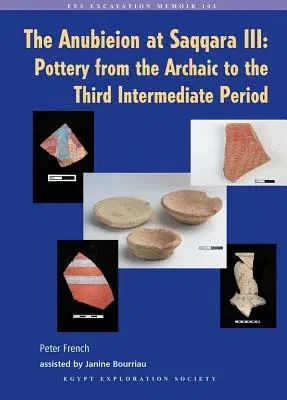Peter French
(Author)The Anubieion at Saqqara III: Pottery from the Archaic to the Third Intermediate PeriodPaperback, 31 December 2013

Qty
1
Turbo
Ships in 2 - 3 days
In Stock
Free Delivery
Cash on Delivery
15 Days
Free Returns
Secure Checkout

Part of Series
Excavation Memoir
Part of Series
Excavation Memoirs
Print Length
467 pages
Language
English
Publisher
Egypt Exploration Society
Date Published
31 Dec 2013
ISBN-10
0856982148
ISBN-13
9780856982149
Description
Product Details
Author:
Book Format:
Paperback
Country of Origin:
US
Date Published:
31 December 2013
ISBN-10:
0856982148
ISBN-13:
9780856982149
Language:
English
Location:
London
Pages:
467
Publisher: